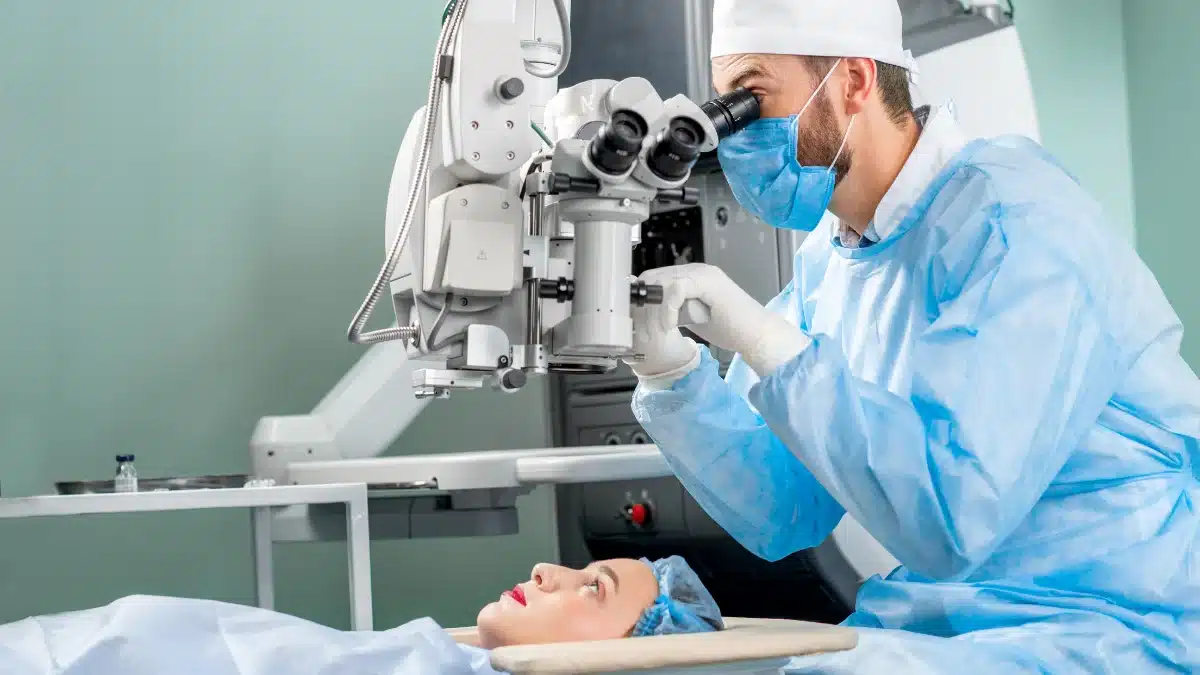Cataract surgery is a procedure that offers enhanced vision and an improved quality of life for millions worldwide.
But just like any other surgical treatment, Cataract surgery has its share of potential drawbacks and risks.
So, what are the disadvantages of Cataract surgery?
The article answers the above question and explores the potential risks of the surgery.
Disadvantages of Cataract surgery
Cataract surgery involves replacing the clouded lens (Cataract) with an artificial eye lens.
The procedure helps restore vision and is considered one of the most effective surgeries.
However, the procedure does have its challenges.
The disadvantages or complications include refractive errors, eye infections, bleeding, Dry Eyes, and more.
Let us explore the complications in detail.
Refractive errors
Cataract surgery aims to improve vision but does not always guarantee perfect results.
Some patients may still experience refractive errors like nearsightedness, farsightedness, or astigmatism after the surgery.
The doctors may recommend prescription glasses or contact lenses to correct the vision errors.
Dry Eyes
 Source: fizkes_from_Getty_Images
Source: fizkes_from_Getty_ImagesCataract surgery can disturb the eye’s natural tear film and may lead to Dry Eyes.
The Dry Eye symptoms include itchiness, redness, excessive tearing, and more.
The doctor may suggest lubricating eye drops or other Dry Eye treatments to help manage the condition post-surgery.
Posterior Capsule Opacity (PCO)
Posterior Capsule Opacity, also known as Secondary Cataracts, is a common Cataract surgery complication.
The condition can mimic the Cataract symptoms and occurs when the posterior capsule becomes cloudy.
Fortunately, the doctors can suggest a quick laser procedure called YAG (Yttrium Aluminum Garnet) capsulotomy to help treat PCO.
Intraocular lens issues
The type of intraocular lens (IOL) implanted during surgery plays an important role in visual outcomes.
Some patients may experience issues like glare, halos, or decreased contrast sensitivity with particular IOLs.
One can choose premium IOLs to eliminate dependency on glasses, but they are expensive and must be covered by insurance.
Consult an eye expert for your lens concerns.
Glaucoma
Glaucoma after Cataract surgery is a possible complication.
The condition can occur due to increased intraocular pressure or damage to the eye’s drainage system during surgery.
Consult an eye expert if you experience Glaucoma symptoms like eye pain, blurred vision, nausea, tunnel vision, and more.
Other eye issues
One may often experience improved vision after the surgery, but it may take weeks to stabilize.
The other complications of Cataract surgery include eye infection, bleeding, a detached retina, and more.
Follow the doctor’s post-operative instructions and attend follow-up appointments as scheduled.
How to reduce the risk of Cataracts
 Source: Satjawat_Boontanataweepol's_Images
Source: Satjawat_Boontanataweepol's_ImagesThe common risk factors of Cataracts include eye injury, previous surgery, lifestyle habits, and more.
Therefore, one should adopt healthy lifestyle habits and protective measures to reduce the risk of Cataracts.
The prevention strategies for Cataracts include protecting the eyes from UV rays, eating a balanced diet, wearing eye protection, and more.
The doctor may also recommend prescription eyeglasses for mild Early Cataracts.
Therefore, one should get regular eye exams to detect any early signs of Cataracts.
Key takeaways
Cataract surgery is an effective procedure that helps improve vision by treating the cloudy eye lens.
The surgical procedure is safe and has a high success rate.
However, many wonder, “What are the disadvantages of Cataract surgery?”
The complications of the surgery include refractive errors, eye infections, dry eyes, intraocular lens issues, and more.
Consult an eye expert if you experience any discomfort after the surgery.
Frequently Asked Questions
How do you deal with the complications of Cataract surgery?
The doctors may prescribe antibiotics, steroids, and anti-inflammatory eye drops to help with the complications of Cataract surgery. However, consult a doctor immediately if the eye drops are ineffective against the complications.
What are the symptoms of Cataracts?
The Cataract symptoms include light sensitivity, cloudy vision, difficulty seeing at night, frequent changes in eyeglass prescriptions, and more. Consult an eye expert for a proper eye exam and diagnosis.
What are the different types of Cataract surgery?
The different types of Cataract surgery include Extracapsular Cataract Extraction, Phacoemulsification, and Intracapsular Cataract Extraction. Consult an eye expert to decide the best surgery according to your symptoms.
What is the best sleeping position after Cataract surgery?
The back sleeping position is the best sleeping position after Cataract surgery. It minimizes the pressure on the eyes and allows a comfortable and undisturbed night’s sleep.
The doctors may also suggest a supportive pillow to help raise your head and reduce the risk of accidental eye rubbing during sleep.
Can I get double vision after Cataract surgery?
Double vision can be an uncommon symptom for many patients after Cataract surgery. However, consult an eye expert if you experience any vision problems.
When referencing outside resources, GoodrxMedicine always provides full citations. To learn more about the measures we use to maintain the quality of our content, please review our Content Information Policy.











